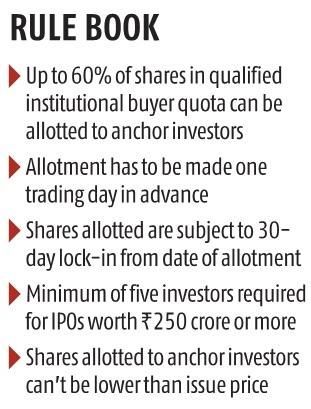 | « Back to article | Print this article |
Through anchor allotment, a firm can demonstrate the demand for shares by getting marquee investors on board.
Samie Modak reports.

More than a decade after its introduction, the government has decided to use the provision of anchor allotment for initial public offering (IPO).
Indian Railway Finance Corporation (IRFC), whose Rs 4,600-crore IPO opened on January 18, became the first offering by a public sector undertaking (PSU) to allot shares to anchor investors.
Industry sources say the government will use the provisions for most of the upcoming IPOs.
"For large IPOs like that of IRFC, getting anchor investors on board brings has benefits. You can get nearly a third of the issue covered even before the IPO opens. Also, if large marquee names invest under the anchor quota, it prompts other investors also to apply," said an investment banker.
Industry players said the provision would come in handy for forthcoming IPOs like those of RailTel Corporation and Life Insurance Corporation.
Almost all private sector IPOs allot shares to anchor investors -- mainly mutual funds, insurance companies, and global funds -- one trading day prior to the issue opening.
Shares are allotted at the discretion of investment bankers handling the IPO.
Anchor investors, however, are barred from selling the shares for at least 30 days from the day of allotment.
Introduced in 2009, the concept is similar to that of a cornerstone investor in developed markets like the US and UK.
Under this, the issuer can allot shares from the qualified institutional buyer (QIB) quota to institutional investors before the IPO opens.
Sebi rules allow up to 60 per cent of the shares in the QIB quota to be allotted to anchor investors.
Typically, 50 per cent of the overall IPO forms the QIB quota.
Nearly 30 per cent of the overall issue size can be raised from anchor investors.
Some IPOs have a mandatory 75 per cent QIB quota.
In such IPOs, anchor investors can play an even bigger role.

Through anchor allotment, a firm can demonstrate the demand for shares by getting marquee investors on board.
Other investors, particularly high net-worth individuals (HNIs), usually take cues from the QIB demand.
Some say exercising anchor allotment will prompt foreign investment banks to go for PSU IPO mandates.
"Investment bankers have the liberty to allot shares under the anchor book. To exercise this benefit, many foreign players will aggressively go for IPO mandates for good public sector companies," said another investment banker.
Allotment to investors applying in the IPO has to be done on a proportionate basis.
For issues that are hugely oversubscribed, large investors miss out on garnering adequate subscriptions.
Experts said using anchor allotment could be a double-edged sword.
"Having a good anchor book can prop up things. However, if an issue fails to get good investors on board or if the anchor portion remains undersubscribed, it can also send a negative signal to the market," said the banker quoted above.